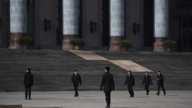【新唐人2012年11月07日讯】在中共即将召开的18大的2270名党代表中,有145位企业负责人代表,其中111名来自国有企业和银行金融系统,34名来自各省市的民营企业单位,这些所谓的“红色企业家”是影响未来中国经济决策走向的重要力量。学者指出,国企、央企就是中共党政部门的延伸,“红色民营企业家也是官僚资本的体现”。
据《中国经济周刊》不完全统计,中共18大的111位代表来自国企、国有金融机构,像中石油、中海油董事长、四大国有银行的负责人、国电集团、华电集团负责人等,都是举足轻重的大企业代表。这些负责人本身官职级别都很高,有的是正部级、副部级,有的还兼任中央委员会或中央候补委员等官衔。
中国问题独立评论员李善鉴认为,在中国,所谓的国有大企业,就是党政部门的延伸,这不像国外的利益集团,他们需要去游说,影响民选政府的政策。
中国问题独立评论员李善鉴:“在中国这种选举完全搞到一起去了,他既是利益集团的代表,也是权力集团的代表。这种情况下的经济发展一定是垄断的、畸形的,不可能是健康的市场。”
资料显示,2010年,中国的GDP近40万亿,而国企仅红利就达到2万亿,仅102家央企在2010年的资产总额,就超过24万亿元。这些垄断大企业给民众带来的却不是利好。
如,中国的油价高于美国,可是,去年(2011年)北京“师范大学”提供的“中国上市公司高管薪酬指数报告”显示,从2007到2010年,“中石油高管人均薪酬”分别是96.29万、89.23万、86.18万和110.22万。而中石油内部却丑闻不断,接二连三发生各种“天价”丑闻,漏油、火灾和污染事故也不断。像大连石油泄漏事故,最后就成了有头无尾的新闻。
不过,令人关注的是,有 34名18大人大代表是来自各省市的民营企业,其中包括“三一重工”董事长梁稳根、“红豆集团”董事长周海江等。
梁稳根,是民营企业家中最引人瞩目的党代表,不仅因为“三一重工”是全球企业市值500强的上市公司,更因为梁稳根的“中国首富”光环和“弃商从政”的想像空间。
梁稳根2004年入党之后发出感慨,声称:把党的事业和“三一”事业融为了一体,“三一”才真正找到了方向!
“三一重工”还将党旗插到了海外,在美国、德国、印度和巴西等国,都建立了党支部。
而周海江的“红豆集团”,它的党建工作在去年(2011年)6月通过了ISO9001品质管制体系认证,并编撰出版中国民企第一套的《党建工作标准》。
《中国经济周刊》指出,这些新当选的企业家代表“政治先进是关键”。
北京时政观察人士华颇:“这些民营企业家的成功,他并非像国外那样靠自己的努力、靠市场竞争,是靠自己的背景取得优先的地位,他们就是一种官僚资本的一种体现。”
财经、社会类评论家巩胜利指出,中共党支部已经渗透到了几乎所有大一点的企业、甚至外企,他认为,国家利益完全被党的利益占据了。
财经社会评论家巩胜利:“18大代表2270人,其中党员干部是1578人,占了69.5%。全部是执政者、全部是当官的人开的这个会。中国13亿多人口,12.2亿没有权利表达,只有中共8200万党员在开这个会,他的合法性在何处啊?”
巩胜利指出,中共采用的是占山为王的规则:从“一大”到18大,依然没有人民参加、人民没有举手权,这与世界上绝大多数国家相悖离,巩胜利说﹕这种执政是没有合法性的。
采访/田净 编辑/宋风 后制/钟元
Red Entrepreneurs at CCP’s 18th Congress
Total of 2,270 Chinese Communist Party’ (CCP) members
will participate in the upcoming CCP’ 18th congress.
Of them, 145 are business executives, 111 from state-owned
enterprises, the banking and financial systems, and 34 are from private enterprises.
These so-called “Red Entrepreneurs" are an important force
to influence China’s economic decisions.
Scholars point out that state-owned and central enterprises
are extensions of the CCP government.
“Red private entrepreneur” is a manifestation
of a “bureaucracy capitalism.”
According to China Economic Weekly’s incomplete statistics,
111 CCP 18th congress delegates are from state-owned enterprises and financial institutions.
These include the chairmen of Petro China and CNOOC,
the four state-owned banks, Guodian’ and Huadian Groups.
They are representatives of key enterprises, as well as
officials at a ministerial level or vice-ministerial level.
Some also have titles like CCP’ Central Committee member,
or the Central Committee alternate member.
Commentator Li Shanjian thinks the so-called state-owned
large enterprises in China are CCP’s government extension.
Unlike foreign interest groups,
who need to lobby to influence the elected government.
Li Shanjian: “China’s election is entirely based on interests.
Government and business representatives are the same group.
This leads to monopoly and deformity of the economic
development. The market cannot be healthy.”
China’s data shows, 2010′ GDP was nearly RMB40 trillion,
with RMB2 trillion state-owned enterprises’ bonus.
The total asset of the 102 central enterprises in 2010,
is more than RMB24 trillion.
What these monopolies bring to the public
is not good.
For example, oil price in China
is higher than in the U.S.
Beijing Normal University published its 2011,
‘Chinese Listed Companies Executive Compensation Index.’
It shows, PetroChina high-level executives’ average salary
is about RMB1 million per year for the period 2007-2010.
During this time many scandals of PetroChina happened,
such as oil spills, fires and pollution, without any flak.
It is worth noting as well that 34 representatives
at the congress are from the private enterprise’ sector.
These include Sany Group’s chairman Liang Wengen,
and Hong Dou Group’ chairman Zhou Haijiang.
Liang Wengen is the most notable CCP representative
from the private entrepreneurs.
Sany is in the global top 500 enterprises, plus Liang is
China’s richest man, known to quit business for politics.
After Liang joined the CCP in 2004, he claimed that Sany
found its path when his CCP’ and Sany’ careers merged.
Sany Group helps exporting CCP’s line overseas, founding
CCP branches in the US, Germany, India, Brazil, etc.
The CCP branch of Zhou Hanjiang’s Hong Dou Group
passed the ISO9001 certification in June 2011.
It then compiled the first set of Party Branch Working
Standard for China’s private enterprises.
China’s Economic Weekly points out that these entrepreneurs’
political stance is the key for them being elected.
Hua Po, Beijing politics observer: “The success of these
entrepreneurs is not from their efforts or market competition.
It is a result of their background.
This is a reflection of the bureaucracy’ capitalism.”
Financial and social critic Gong Shengli points out, CCP’s
tentacles penetrate almost all large enterprises, even foreign.
He believes that the national interest is fully submissive
to the interests of the CCP.
Gong Shengli: “Of the 2,270 delegates of the 18th congress,
1,578 (69.5%) are party members and cadres.
The participants are all those in power.
China’s population is 1.3 billion, with 1.22 billion having
no right to express themselves.
The congress is only for the 82 million CCP members.
What is its legitimacy then?"
Gong Shengli pointed out that CCP adopted the approach,
“Occupying the country and use it as your own.”
From CCP’s 1st to its coming 18th congress,
people have never had the right to vote.
This is different for the most countries in the world.
Thus its ruling has no legitimacy, Gong Shengli said.




























